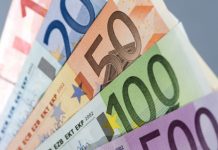The pound fell steadily versus a stronger euro in Monday’s session. The pound euro exchange rate moved lower reaching a nadir of €1.1339.
| What do these figures mean? |
|---|
| When measuring the value of a pair of currencies, one set equals 1 unit and the other shows the current equivalent. As the market moves, the amount will vary from minute to minute. For example, it could be written: 1 GBP = 1.13990 EUR Here, £1 is equivalent to approximately €1.14. This specifically measures the pound’s worth against the euro. If the euro amount increases in this pairing, it’s positive for the pound. Or, if you were looking at it the other way around: 1 EUR = 0.87271 GBP In this example, €1 is equivalent to approximately £0.87. This measures the euro’s worth versus the British pound. If the sterling number gets larger, it’s good news for the euro. |
Pound weakness continued on Monday as Brexit concerns kept sterling out of favour. Hopes had been running high that there may be some progress on Brexit at the EU Summit which starts on Thursday. However UK Prime Minister Theresa May has since told the European Council President Mr Tusk that the UK paper outlining Britain’s Brexit demands will not be ready until after the summit. This makes any Brexit progress at the summit increasingly unlikely. With the clock ticking towards the October deadline no new developments is making a no deal Brexit, even more likely.
Business leaders have made no secret of their concerns over a no deal Brexit on businesses in the UK. Airbus threatened to withdraw from the UK last week in the case of a no deal Brexit and BMW on Monday indicted a similar plan of action. There is growing evidence from these firms that the economy will be badly hit should a no deal Brexit or a hard Brexit become a reality.
| Why is a “soft” Brexit better for sterling than a “hard” Brexit? |
|---|
| A soft Brexit implies anything less than UK’s complete withdrawal from the EU. For example, it could mean the UK retains some form of membership to the European Union single market in exchange for some free movement of people, i.e. immigration. This is considered more positive than a “hard” Brexit, which is a full severance from the EU. The reason “soft” is considered more pound-friendly is because the economic impact would be lower. If there is less negative impact on the economy, foreign investors will continue to invest in the UK. As investment requires local currency, this increased demand for the pound then boosts its value. |
Today there is no high impact data on the UK economic calendar, so analysts are anticipating that Brexit jitters will continue to weigh on sterling.
Euro Rallies As German Business Confidence Slips
The euro managed to gain ground at the start of the week on signs of weakening confidence in Germany, amid growing trade war fears. The German business confidence survey slipped to 101.8 as expected by analysts. The fall is only marginal compared to 102.3 in May, given the increasing trade tensions with the US. This includes Trump’s threatening to put 20% trade tariffs on EU cars, which would hit the German economy hard.
| Why does strong economic data boost a country’s currency? |
|---|
| Solid economic indicators point to a strong economy. Strong economies have strong currencies because institutions look to invest in countries where growth prospects are high. These institutions require local currency to invest in the country, thus increasing demand and pushing up the money’s worth. So, when a country or region has good economic news, the value of the currency tends to rise. |
The euro was also benefitting from a weaker dollar on Monday, as trade war concerns finally started to hit the dollar. Up until now the dollar had been benefiting from its safe haven status, with investors wanting to buy into the dollar as global tensions increased. However, investors are starting to realise the damage that the coming trade war will do to the US economy, sending the dollar lower. The euro often trades inversely to the us dollar, therefore sending the common currency higher.
|
This article was initially published on TransferWise.com from the same author. The content at Currency Live is the sole opinion of the authors and in no way reflects the views of TransferWise Inc. |





